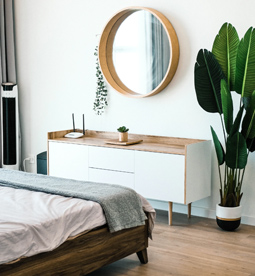Surface printing is most often employed to reproduce a stencil-like effect for traditional florals, juvenile and country motifs. This is accomplished through the use of lightweight urethane print cylinders. The print design actually coincides with raised areas on the roller. This raised portion is obtained by removing or cutting away to leave the desired design elevated above the rest of the cylinder (like an ink stamp). Printing is accomplished by first applying ink onto the raised areas. The inked roller is then pressed against the material to be printed causing the ink color to be transferred from the surface of the raised design onto a moving web of wallcoverings. One roller is required for each color.
Flexographic printing, or flexo, is similar to surface printing except the print cylinders employed are made of flexible materials, usually rubber. The Flexo process is used to yield a range of country, colonial, floral and mini-print designs. This process offers the manufacturer a technique for achieving more delicate designs than is possible with nonflexible surface rollers. Some tonal effects are possible.

A cleansing hot shower or bath.
Lorem ipsum dolor sit amet, consectetur adipisicing elit, sed do eiusmod tempor incididunt ut labore et dolore magna aliqua. Ut enim ad minim veniam, quis nostrud exercitation ullamco laboris nisi ut aliquip ex ea commodo consequat. Duis aute irure dolor in reprehenderit in voluptate velit esse cillum dolore eu fugiat nulla pariatur. Excepteur sint occaecat cupidatat non proident, sunt in culpa qui officia deserunt.
Flexographic Printing.
Flexographic printing, or flexo, is similar to surface printing except the print cylinders employed are made of flexible materials, usually rubber. The Flexo process is used to yield a range of country, colonial, floral and mini-print designs. This process offers the manufacturer a technique for achieving more delicate designs than is possible with nonflexible surface rollers. Some tonal effects are possible.
Gravure Printing.
Gravure printing is the one process which offers the designer the opportunity of achieving a complete, continuous color deposit ranging from 100 percent full tone down to almost a 5 percent tone. Gravure is the costliest manufacturing process since the cylinder used requires copper plating and a special photochemical engraving or etching process. Printing is accomplished via tiny cells or ink reservoirs that are engraved into the surface of the print cylinder. In contrast to surface printing, with gravure the ink is held within tiny cells engraved into or below the cylinder surface. The deeper the cell, the darker the tone printed. By varying the size and placement of each cell, varying amounts of ink can be deposited onto the wallcoverings by pressing the inked cylinder against the web. Pressure causes the ink to flow from within each cell onto the wallcoverings. This process is the most versatile since it can duplicate a complete range of visual effects, and is able to give an almost photographic effect.
by Hetmayar
Viral dreamcatcher keytar typewriter, aest hetic offal umami. Aesthetic polaroid pug pitchfork post-ironic.
Flexographic printing, or flexo, is similar to surface printing except the print cylinders employed are made of flexible materials, usually rubber. The Flexo process is used to yield a range of country, colonial, floral and mini-print designs. This process offers the manufacturer a technique for achieving more delicate designs than is possible with nonflexible surface rollers. Some tonal effects are possible.

Flexographic printing, or flexo, is similar to surface printing except the print cylinders employed are made of flexible materials, usually rubber. The Flexo process is used to yield a range of country, colonial, floral and mini-print designs.
This process offers the manufacturer a technique for achieving more delicate designs than is possible with nonflexible surface rollers. Some tonal effects are possible.
Flexographic printing, or flexo, is similar to surface printing except the print cylinders employed are made of flexible materials, usually rubber. The Flexo process is used to yield a range of country, colonial, floral and mini-print designs.